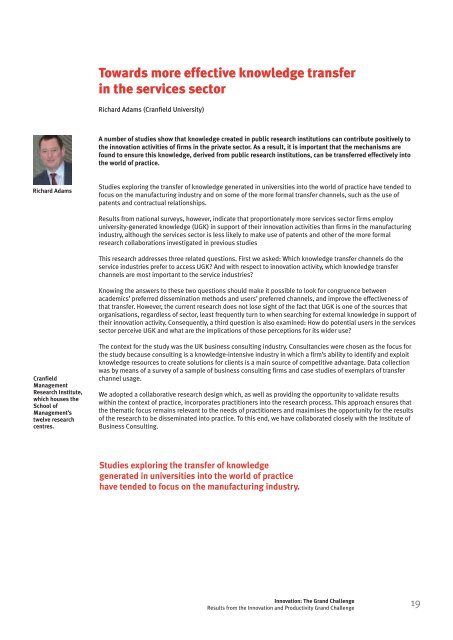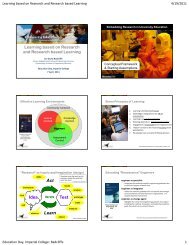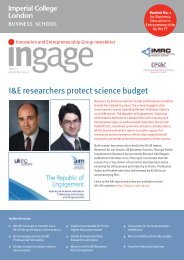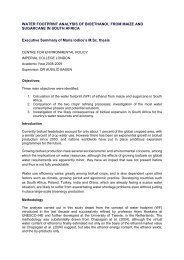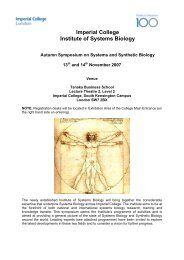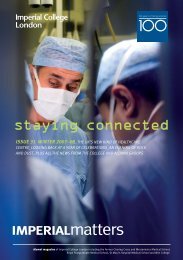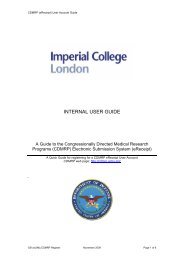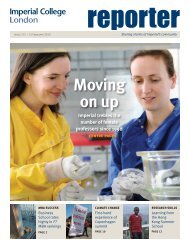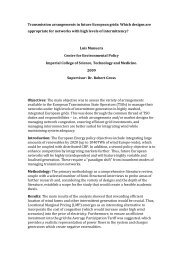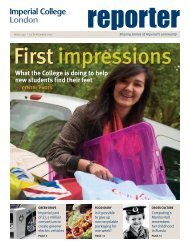INNOVATION: THE GRAND CHALLENGE - Imperial College London
INNOVATION: THE GRAND CHALLENGE - Imperial College London
INNOVATION: THE GRAND CHALLENGE - Imperial College London
Create successful ePaper yourself
Turn your PDF publications into a flip-book with our unique Google optimized e-Paper software.
Towards more effective knowledge transfer<br />
in the services sector<br />
Richard Adams (Cranfield University)<br />
A number of studies show that knowledge created in public research institutions can contribute positively to<br />
the innovation activities of firms in the private sector. As a result, it is important that the mechanisms are<br />
found to ensure this knowledge, derived from public research institutions, can be transferred effectively into<br />
the world of practice.<br />
Richard Adams<br />
Studies exploring the transfer of knowledge generated in universities into the world of practice have tended to<br />
focus on the manufacturing industry and on some of the more formal transfer channels, such as the use of<br />
patents and contractual relationships.<br />
Results from national surveys, however, indicate that proportionately more services sector firms employ<br />
university-generated knowledge (UGK) in support of their innovation activities than firms in the manufacturing<br />
industry, although the services sector is less likely to make use of patents and other of the more formal<br />
research collaborations investigated in previous studies<br />
This research addresses three related questions. First we asked: Which knowledge transfer channels do the<br />
service industries prefer to access UGK? And with respect to innovation activity, which knowledge transfer<br />
channels are most important to the service industries?<br />
Knowing the answers to these two questions should make it possible to look for congruence between<br />
academics’ preferred dissemination methods and users’ preferred channels, and improve the effectiveness of<br />
that transfer. However, the current research does not lose sight of the fact that UGK is one of the sources that<br />
organisations, regardless of sector, least frequently turn to when searching for external knowledge in support of<br />
their innovation activity. Consequently, a third question is also examined: How do potential users in the services<br />
sector perceive UGK and what are the implications of those perceptions for its wider use?<br />
Cranfield<br />
Management<br />
Research Institute,<br />
which houses the<br />
School of<br />
Management’s<br />
twelve research<br />
centres.<br />
The context for the study was the UK business consulting industry. Consultancies were chosen as the focus for<br />
the study because consulting is a knowledge-intensive industry in which a firm’s ability to identify and exploit<br />
knowledge resources to create solutions for clients is a main source of competitive advantage. Data collection<br />
was by means of a survey of a sample of business consulting firms and case studies of exemplars of transfer<br />
channel usage.<br />
We adopted a collaborative research design which, as well as providing the opportunity to validate results<br />
within the context of practice, incorporates practitioners into the research process. This approach ensures that<br />
the thematic focus remains relevant to the needs of practitioners and maximises the opportunity for the results<br />
of the research to be disseminated into practice. To this end, we have collaborated closely with the Institute of<br />
Business Consulting.<br />
Studies exploring the transfer of knowledge<br />
generated in universities into the world of practice<br />
have tended to focus on the manufacturing industry.<br />
Innovation: The Grand Challenge<br />
Results from the Innovation and Productivity Grand Challenge<br />
19


